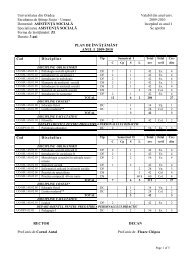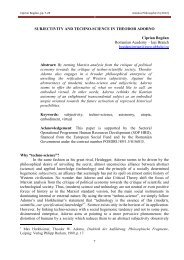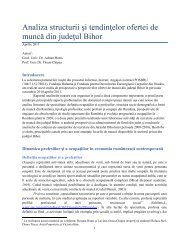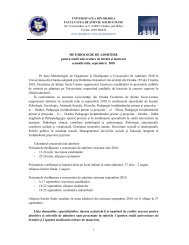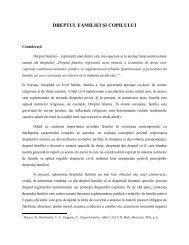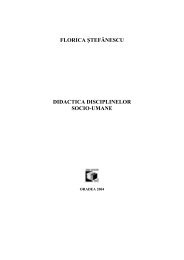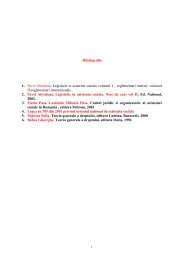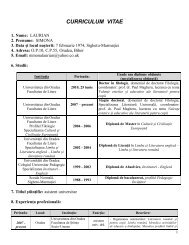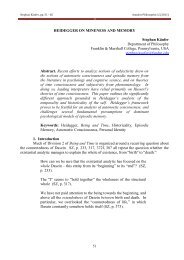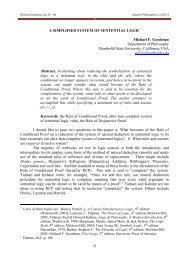the romantic theory of understanding and ... - socioumane.ro
the romantic theory of understanding and ... - socioumane.ro
the romantic theory of understanding and ... - socioumane.ro
You also want an ePaper? Increase the reach of your titles
YUMPU automatically turns print PDFs into web optimized ePapers that Google loves.
Navid Afsharzadeh, pp. 11-18 Annales Philosophici 6 (2013)<br />
THE ROMANTIC THEORY OF UNDERSTANDING AND THE<br />
AESTHETICS OF FRAGMENTARY WRITING<br />
Navid Afsharzadeh<br />
Allameh Tabatabaii University<br />
Iran<br />
navid.afsharzadeh@yahoo.com<br />
Abstract: Despite its short life in Jena, Early German Romanticism<br />
p<strong>ro</strong>vided a p<strong>ro</strong>ductive <st<strong>ro</strong>ng>the</st<strong>ro</strong>ng>ory <st<strong>ro</strong>ng>of</st<strong>ro</strong>ng> Aes<st<strong>ro</strong>ng>the</st<strong>ro</strong>ng>tics, which still remains a<br />
subject <st<strong>ro</strong>ng>of</st<strong>ro</strong>ng> discussion <st<strong>ro</strong>ng>and</st<strong>ro</strong>ng> even cont<strong>ro</strong>versy in contemporary thought.<br />
What is most remarkable about <st<strong>ro</strong>ng>the</st<strong>ro</strong>ng>se young thinkers is <st<strong>ro</strong>ng>the</st<strong>ro</strong>ng>ir radical<br />
attitude toward crucial p<strong>ro</strong>blems such as <st<strong>ro</strong>ng>the</st<strong>ro</strong>ng> <strong>ro</strong>le <st<strong>ro</strong>ng>of</st<strong>ro</strong>ng> language in<br />
human knowledge, limits <st<strong>ro</strong>ng>of</st<strong>ro</strong>ng> <st<strong>ro</strong>ng>underst<st<strong>ro</strong>ng>and</st<strong>ro</strong>ng>ing</st<strong>ro</strong>ng> <st<strong>ro</strong>ng>and</st<strong>ro</strong>ng> also <st<strong>ro</strong>ng>the</st<strong>ro</strong>ng> form <st<strong>ro</strong>ng>of</st<strong>ro</strong>ng><br />
philosophical writing. By discussing <st<strong>ro</strong>ng>the</st<strong>ro</strong>ng> p<strong>ro</strong>blem <st<strong>ro</strong>ng>of</st<strong>ro</strong>ng> language <st<strong>ro</strong>ng>and</st<strong>ro</strong>ng> its<br />
position in <st<strong>ro</strong>ng><strong>ro</strong>mantic</st<strong>ro</strong>ng> philosophical aes<st<strong>ro</strong>ng>the</st<strong>ro</strong>ng>tics, this article emphasizes<br />
<st<strong>ro</strong>ng>the</st<strong>ro</strong>ng> important <strong>ro</strong>le <st<strong>ro</strong>ng>of</st<strong>ro</strong>ng> "incomprehensibility" as a crucial concept in<br />
early German <st<strong>ro</strong>ng><strong>ro</strong>mantic</st<strong>ro</strong>ng>s view, which besides <st<strong>ro</strong>ng>the</st<strong>ro</strong>ng>ir Antifoundationalist<br />
philosophy, p<strong>ro</strong>vides <st<strong>ro</strong>ng>the</st<strong>ro</strong>ng> basis <st<strong>ro</strong>ng>of</st<strong>ro</strong>ng> <st<strong>ro</strong>ng>the</st<strong>ro</strong>ng>ir fragmentary<br />
writing as a new manner <st<strong>ro</strong>ng>of</st<strong>ro</strong>ng> reflection. Drawing on Blanchot <st<strong>ro</strong>ng>and</st<strong>ro</strong>ng><br />
Critchley, it will be argued that <st<strong>ro</strong>ng>the</st<strong>ro</strong>ng> self-consciousness <st<strong>ro</strong>ng>of</st<strong>ro</strong>ng> fragmentary<br />
text <st<strong>ro</strong>ng>of</st<strong>ro</strong>ng> its own failure <st<strong>ro</strong>ng>and</st<strong>ro</strong>ng> unworking is <st<strong>ro</strong>ng>the</st<strong>ro</strong>ng> very key to its infinity, <st<strong>ro</strong>ng>and</st<strong>ro</strong>ng><br />
positive reaction toward <st<strong>ro</strong>ng>the</st<strong>ro</strong>ng> existence.<br />
Keywords: Incomprehensibility, Fragmentary writing, Negativity <st<strong>ro</strong>ng>and</st<strong>ro</strong>ng><br />
positivity, I<strong>ro</strong>ny, unworking<br />
Int<strong>ro</strong>duction<br />
The <st<strong>ro</strong>ng><strong>ro</strong>mantic</st<strong>ro</strong>ng> viewpoint regarding <st<strong>ro</strong>ng>the</st<strong>ro</strong>ng> <st<strong>ro</strong>ng>the</st<strong>ro</strong>ng>ory <st<strong>ro</strong>ng>of</st<strong>ro</strong>ng> <st<strong>ro</strong>ng>underst<st<strong>ro</strong>ng>and</st<strong>ro</strong>ng>ing</st<strong>ro</strong>ng> plays a crucial <strong>ro</strong>le in<br />
<st<strong>ro</strong>ng>the</st<strong>ro</strong>ng>ir worldview <st<strong>ro</strong>ng>and</st<strong>ro</strong>ng> especially in relation to <st<strong>ro</strong>ng>the</st<strong>ro</strong>ng>ir philosophy <st<strong>ro</strong>ng>and</st<strong>ro</strong>ng> aes<st<strong>ro</strong>ng>the</st<strong>ro</strong>ng>tics. Before setting<br />
out toward <st<strong>ro</strong>ng>the</st<strong>ro</strong>ng> main discussion <st<strong>ro</strong>ng>of</st<strong>ro</strong>ng> this article a few points should be taken into consideration.<br />
First <st<strong>ro</strong>ng>of</st<strong>ro</strong>ng> all, according to <st<strong>ro</strong>ng>the</st<strong>ro</strong>ng> studies <st<strong>ro</strong>ng>of</st<strong>ro</strong>ng> contemporary philosophy <st<strong>ro</strong>ng>the</st<strong>ro</strong>ng> <st<strong>ro</strong>ng><strong>ro</strong>mantic</st<strong>ro</strong>ng> <st<strong>ro</strong>ng>the</st<strong>ro</strong>ng>ory <st<strong>ro</strong>ng>of</st<strong>ro</strong>ng><br />
<st<strong>ro</strong>ng>underst<st<strong>ro</strong>ng>and</st<strong>ro</strong>ng>ing</st<strong>ro</strong>ng> could be divided into two basic branches regarding hermeneutics. The <st<strong>ro</strong>ng><strong>ro</strong>mantic</st<strong>ro</strong>ng><br />
hermeneutics _ which is mainly recognized by <st<strong>ro</strong>ng>the</st<strong>ro</strong>ng> name <st<strong>ro</strong>ng>of</st<strong>ro</strong>ng> Freidrich Schleiermacher_ takes a<br />
different shape in Freidrich Schlegel <st<strong>ro</strong>ng>and</st<strong>ro</strong>ng> Novalis's view. While Schleiermacher emphasizes<br />
on comprehensibility <st<strong>ro</strong>ng>and</st<strong>ro</strong>ng> better <st<strong>ro</strong>ng>underst<st<strong>ro</strong>ng>and</st<strong>ro</strong>ng>ing</st<strong>ro</strong>ng> as <st<strong>ro</strong>ng>the</st<strong>ro</strong>ng> goals <st<strong>ro</strong>ng>of</st<strong>ro</strong>ng> hermeneutics, Novalis <st<strong>ro</strong>ng>and</st<strong>ro</strong>ng><br />
especially Schlegel reveal a more hidden aspect <st<strong>ro</strong>ng>of</st<strong>ro</strong>ng> <st<strong>ro</strong>ng><strong>ro</strong>mantic</st<strong>ro</strong>ng> hermeneutics in which <st<strong>ro</strong>ng>the</st<strong>ro</strong>ng>y<br />
highlight <st<strong>ro</strong>ng>the</st<strong>ro</strong>ng> dark side <st<strong>ro</strong>ng>of</st<strong>ro</strong>ng> words <st<strong>ro</strong>ng>and</st<strong>ro</strong>ng> acknowledge <st<strong>ro</strong>ng>the</st<strong>ro</strong>ng> limits <st<strong>ro</strong>ng>of</st<strong>ro</strong>ng> <st<strong>ro</strong>ng>underst<st<strong>ro</strong>ng>and</st<strong>ro</strong>ng>ing</st<strong>ro</strong>ng>. Ano<st<strong>ro</strong>ng>the</st<strong>ro</strong>ng>r<br />
important point is that we should not pursue <st<strong>ro</strong>ng>the</st<strong>ro</strong>ng> results <st<strong>ro</strong>ng>of</st<strong>ro</strong>ng> <st<strong>ro</strong>ng>the</st<strong>ro</strong>ng> <st<strong>ro</strong>ng><strong>ro</strong>mantic</st<strong>ro</strong>ng> <st<strong>ro</strong>ng>the</st<strong>ro</strong>ng>ory <st<strong>ro</strong>ng>of</st<strong>ro</strong>ng><br />
<st<strong>ro</strong>ng>underst<st<strong>ro</strong>ng>and</st<strong>ro</strong>ng>ing</st<strong>ro</strong>ng> merely in relation to hermeneutics. The <st<strong>ro</strong>ng><strong>ro</strong>mantic</st<strong>ro</strong>ng> <st<strong>ro</strong>ng>the</st<strong>ro</strong>ng>ory <st<strong>ro</strong>ng>of</st<strong>ro</strong>ng> <st<strong>ro</strong>ng>underst<st<strong>ro</strong>ng>and</st<strong>ro</strong>ng>ing</st<strong>ro</strong>ng> also<br />
plays an important <strong>ro</strong>le in <st<strong>ro</strong>ng>the</st<strong>ro</strong>ng> aes<st<strong>ro</strong>ng>the</st<strong>ro</strong>ng>tic tradition <st<strong>ro</strong>ng>of</st<strong>ro</strong>ng> early German <st<strong>ro</strong>ng><strong>ro</strong>mantic</st<strong>ro</strong>ng>ism. This is<br />
especially evident in <st<strong>ro</strong>ng>the</st<strong>ro</strong>ng> style <st<strong>ro</strong>ng>of</st<strong>ro</strong>ng> fragmentary writing as a kind <st<strong>ro</strong>ng>of</st<strong>ro</strong>ng> non-systematic thinking<br />
emerged in a philosophico-literary form.<br />
11
Annales Philosophici 6 (2013) Navid Afsharzadeh, pp. 11-18<br />
In his treatise with its persuasive title, namely "On Incomprehensibility" Freidrich<br />
Schlegel deals with <st<strong>ro</strong>ng>the</st<strong>ro</strong>ng> concept <st<strong>ro</strong>ng>of</st<strong>ro</strong>ng> <st<strong>ro</strong>ng>underst<st<strong>ro</strong>ng>and</st<strong>ro</strong>ng>ing</st<strong>ro</strong>ng> <st<strong>ro</strong>ng>and</st<strong>ro</strong>ng> in <st<strong>ro</strong>ng>the</st<strong>ro</strong>ng> meantime takes a deep look on<br />
several topics such as <st<strong>ro</strong>ng>the</st<strong>ro</strong>ng> nature <st<strong>ro</strong>ng>of</st<strong>ro</strong>ng> reading <st<strong>ro</strong>ng>and</st<strong>ro</strong>ng> interpreting texts. Incomprehensibility, which<br />
according to Schlegel, signifies <st<strong>ro</strong>ng>the</st<strong>ro</strong>ng> natural incompleteness <st<strong>ro</strong>ng>of</st<strong>ro</strong>ng> human experience <st<strong>ro</strong>ng>and</st<strong>ro</strong>ng> <st<strong>ro</strong>ng>the</st<strong>ro</strong>ng><br />
impossibility <st<strong>ro</strong>ng>of</st<strong>ro</strong>ng> perfect communication, manifests itself in a genre called fragment. For<br />
<st<strong>ro</strong>ng><strong>ro</strong>mantic</st<strong>ro</strong>ng> thinkers, fragmentary writing is a medium for thinking philosophically, which by<br />
applying i<strong>ro</strong>ny, represents <st<strong>ro</strong>ng>the</st<strong>ro</strong>ng> text's self-consciousness <st<strong>ro</strong>ng>of</st<strong>ro</strong>ng> its own incompleteness <st<strong>ro</strong>ng>and</st<strong>ro</strong>ng> shows<br />
<st<strong>ro</strong>ng>the</st<strong>ro</strong>ng> constant rupture in <st<strong>ro</strong>ng>the</st<strong>ro</strong>ng> totality <st<strong>ro</strong>ng>of</st<strong>ro</strong>ng> cognitive perception.<br />
However, this element <st<strong>ro</strong>ng>of</st<strong>ro</strong>ng> negativity in Schlegel's thought does not turn to be an<br />
absolute moment. In fact Schlegel believed that <st<strong>ro</strong>ng>the</st<strong>ro</strong>ng> acceptance <st<strong>ro</strong>ng>of</st<strong>ro</strong>ng> <st<strong>ro</strong>ng>the</st<strong>ro</strong>ng>se very limits will itself<br />
leads to open a space for <st<strong>ro</strong>ng>the</st<strong>ro</strong>ng> possibility <st<strong>ro</strong>ng>of</st<strong>ro</strong>ng> p<strong>ro</strong>ductive creation. Romantic fragment has a sign<br />
<st<strong>ro</strong>ng>of</st<strong>ro</strong>ng> what <st<strong>ro</strong>ng>the</st<strong>ro</strong>ng>y called "<st<strong>ro</strong>ng>the</st<strong>ro</strong>ng> p<strong>ro</strong>cess <st<strong>ro</strong>ng>of</st<strong>ro</strong>ng> infinite becoming" within itself, <st<strong>ro</strong>ng>and</st<strong>ro</strong>ng> although signifies <st<strong>ro</strong>ng>the</st<strong>ro</strong>ng><br />
lack <st<strong>ro</strong>ng>of</st<strong>ro</strong>ng> final syn<st<strong>ro</strong>ng>the</st<strong>ro</strong>ng>sis, at <st<strong>ro</strong>ng>the</st<strong>ro</strong>ng> same time it is a perpetual creation which rises f<strong>ro</strong>m <st<strong>ro</strong>ng>the</st<strong>ro</strong>ng> heart <st<strong>ro</strong>ng>of</st<strong>ro</strong>ng><br />
ruins.<br />
The Nature <st<strong>ro</strong>ng>of</st<strong>ro</strong>ng> Language<br />
More than o<st<strong>ro</strong>ng>the</st<strong>ro</strong>ng>r representatives <st<strong>ro</strong>ng>of</st<strong>ro</strong>ng> early German <st<strong>ro</strong>ng><strong>ro</strong>mantic</st<strong>ro</strong>ng>ism, Freidrich Schlegel <st<strong>ro</strong>ng>and</st<strong>ro</strong>ng><br />
Novalis emphasize on <st<strong>ro</strong>ng>the</st<strong>ro</strong>ng> limits <st<strong>ro</strong>ng>and</st<strong>ro</strong>ng> chaotic nature <st<strong>ro</strong>ng>of</st<strong>ro</strong>ng> language. Novalis shows <st<strong>ro</strong>ng>the</st<strong>ro</strong>ng> way that<br />
language prevents us f<strong>ro</strong>m achieving a complete <st<strong>ro</strong>ng>and</st<strong>ro</strong>ng> ordered idea, in one <st<strong>ro</strong>ng>of</st<strong>ro</strong>ng> his remarkable<br />
monologues:<br />
"It is a strange thing about speaking <st<strong>ro</strong>ng>and</st<strong>ro</strong>ng> writing; a real conversation is just a game <st<strong>ro</strong>ng>of</st<strong>ro</strong>ng><br />
words. One can only be amazed at <st<strong>ro</strong>ng>the</st<strong>ro</strong>ng> ridiculous mistake that people think <st<strong>ro</strong>ng>the</st<strong>ro</strong>ng>y speak for <st<strong>ro</strong>ng>the</st<strong>ro</strong>ng><br />
sake <st<strong>ro</strong>ng>of</st<strong>ro</strong>ng> things. Of <st<strong>ro</strong>ng>the</st<strong>ro</strong>ng> fact that language is peculiar because it only concerns itself with itself,<br />
nobody is aware. That is why it is a wonderful <st<strong>ro</strong>ng>and</st<strong>ro</strong>ng> fruitful secret, —that precisely when<br />
someone speaks just in order to speak he p<strong>ro</strong>nounces <st<strong>ro</strong>ng>the</st<strong>ro</strong>ng> most splendid <st<strong>ro</strong>ng>and</st<strong>ro</strong>ng> original truths.<br />
But if he wishes to speak <st<strong>ro</strong>ng>of</st<strong>ro</strong>ng> something determinate, temperamental old language makes him<br />
say <st<strong>ro</strong>ng>the</st<strong>ro</strong>ng> most ridiculous <st<strong>ro</strong>ng>and</st<strong>ro</strong>ng> mistaken things. That is also <st<strong>ro</strong>ng>the</st<strong>ro</strong>ng> source <st<strong>ro</strong>ng>of</st<strong>ro</strong>ng> <st<strong>ro</strong>ng>the</st<strong>ro</strong>ng> hatred which so<br />
many serious people have for language. They notice its mischief but do not notice that<br />
wretched chattering is <st<strong>ro</strong>ng>the</st<strong>ro</strong>ng> infinitely serious side <st<strong>ro</strong>ng>of</st<strong>ro</strong>ng> language. If one could only make people<br />
underst<st<strong>ro</strong>ng>and</st<strong>ro</strong>ng> that with language it is as with ma<st<strong>ro</strong>ng>the</st<strong>ro</strong>ng>matical formulae—<st<strong>ro</strong>ng>the</st<strong>ro</strong>ng>y constitute <st<strong>ro</strong>ng>the</st<strong>ro</strong>ng>ir own<br />
world—<st<strong>ro</strong>ng>the</st<strong>ro</strong>ng>y only play with <st<strong>ro</strong>ng>the</st<strong>ro</strong>ng>mselves, express nothing but <st<strong>ro</strong>ng>the</st<strong>ro</strong>ng>ir wonderful nature." (qtd. In.<br />
Bowie 2002 pp. 65-66)<br />
Since <st<strong>ro</strong>ng>the</st<strong>ro</strong>ng> poet is a person who "speaks just in order to speak", his truths are more<br />
splendid <st<strong>ro</strong>ng>and</st<strong>ro</strong>ng> original than those "serious people" <st<strong>ro</strong>ng>and</st<strong>ro</strong>ng> especially philosophers who apply a<br />
conceptual non-i<strong>ro</strong>nic language for thinking <st<strong>ro</strong>ng>and</st<strong>ro</strong>ng> limit <st<strong>ro</strong>ng>the</st<strong>ro</strong>ng>mselves to <st<strong>ro</strong>ng>the</st<strong>ro</strong>ng> borders <st<strong>ro</strong>ng>of</st<strong>ro</strong>ng> finite<br />
reflection. In a close relation to Novalis, Friedrich Schlegel also recognizes a negative element<br />
in language <st<strong>ro</strong>ng>and</st<strong>ro</strong>ng> turns it to an exigency <st<strong>ro</strong>ng>of</st<strong>ro</strong>ng> <st<strong>ro</strong>ng>the</st<strong>ro</strong>ng> possibility <st<strong>ro</strong>ng>of</st<strong>ro</strong>ng> knowledge. As Behler puts it, <st<strong>ro</strong>ng>the</st<strong>ro</strong>ng>ir<br />
main concern was ra<st<strong>ro</strong>ng>the</st<strong>ro</strong>ng>r a "joyful acceptance" <st<strong>ro</strong>ng>of</st<strong>ro</strong>ng> <st<strong>ro</strong>ng>the</st<strong>ro</strong>ng> limited character <st<strong>ro</strong>ng>of</st<strong>ro</strong>ng> our language <st<strong>ro</strong>ng>and</st<strong>ro</strong>ng> at<br />
<st<strong>ro</strong>ng>the</st<strong>ro</strong>ng> same time an affirmation for a space for possibility. (Behler 1993 p. 273) Schlegel<br />
suggests that we cannot ignore <st<strong>ro</strong>ng>the</st<strong>ro</strong>ng> words or just casually use <st<strong>ro</strong>ng>the</st<strong>ro</strong>ng>m, instead we should<br />
encounter with <st<strong>ro</strong>ng>the</st<strong>ro</strong>ng>ir o<st<strong>ro</strong>ng>the</st<strong>ro</strong>ng>rness <st<strong>ro</strong>ng>and</st<strong>ro</strong>ng> darkness. He links <st<strong>ro</strong>ng>the</st<strong>ro</strong>ng> p<strong>ro</strong>blem <st<strong>ro</strong>ng>of</st<strong>ro</strong>ng> language directly to <st<strong>ro</strong>ng>the</st<strong>ro</strong>ng><br />
category <st<strong>ro</strong>ng>of</st<strong>ro</strong>ng> <st<strong>ro</strong>ng>underst<st<strong>ro</strong>ng>and</st<strong>ro</strong>ng>ing</st<strong>ro</strong>ng>. He takes a st<st<strong>ro</strong>ng>and</st<strong>ro</strong>ng> against <st<strong>ro</strong>ng>the</st<strong>ro</strong>ng> concept <st<strong>ro</strong>ng>of</st<strong>ro</strong>ng> language as mere tool <st<strong>ro</strong>ng>of</st<strong>ro</strong>ng><br />
communicating reflective ideas <st<strong>ro</strong>ng>and</st<strong>ro</strong>ng> instead emphasizes on <st<strong>ro</strong>ng>the</st<strong>ro</strong>ng> inevitability <st<strong>ro</strong>ng>of</st<strong>ro</strong>ng> words,<br />
regarding <st<strong>ro</strong>ng>the</st<strong>ro</strong>ng> notion <st<strong>ro</strong>ng>of</st<strong>ro</strong>ng> <st<strong>ro</strong>ng>underst<st<strong>ro</strong>ng>and</st<strong>ro</strong>ng>ing</st<strong>ro</strong>ng>. He ridicules <st<strong>ro</strong>ng>the</st<strong>ro</strong>ng> idea <st<strong>ro</strong>ng>of</st<strong>ro</strong>ng> "philosophical language", or<br />
language as a mere tool for expressing clear concepts. But as Strathman says, "words just get<br />
in <st<strong>ro</strong>ng>the</st<strong>ro</strong>ng> way <st<strong>ro</strong>ng>of</st<strong>ro</strong>ng> rational <st<strong>ro</strong>ng>underst<st<strong>ro</strong>ng>and</st<strong>ro</strong>ng>ing</st<strong>ro</strong>ng>. The basic tendency <st<strong>ro</strong>ng>of</st<strong>ro</strong>ng> words, left to <st<strong>ro</strong>ng>the</st<strong>ro</strong>ng>mselves, is<br />
12
Navid Afsharzadeh, pp. 11-18 Annales Philosophici 6 (2013)<br />
always toward chaos ra<st<strong>ro</strong>ng>the</st<strong>ro</strong>ng>r than order, or toward an order that is not quite recognizable as<br />
such." (A.Strathman 2006, p.50)<br />
Thus, Schlegel believed that listening to language's dem<st<strong>ro</strong>ng>and</st<strong>ro</strong>ng>s, <st<strong>ro</strong>ng>and</st<strong>ro</strong>ng> acknowledging its<br />
struggle against giving up to conceptual cont<strong>ro</strong>l, is precisely what makes <st<strong>ro</strong>ng>underst<st<strong>ro</strong>ng>and</st<strong>ro</strong>ng>ing</st<strong>ro</strong>ng> as<br />
thinking possible. What is important about Schlegel's app<strong>ro</strong>ach toward language could be<br />
noted within his viewpoint about fragment as a philosophico-literary genre. By adopting a<br />
critical attitude, Schlegel believes that it is exactly <st<strong>ro</strong>ng>the</st<strong>ro</strong>ng> language's strange humor which<br />
philosophy, with all its seriousness could not "take serious". "To retain its seriousness <st<strong>ro</strong>ng>and</st<strong>ro</strong>ng><br />
respectability, philosophy has to maintain cont<strong>ro</strong>l over words, has to get words straight, get<br />
<st<strong>ro</strong>ng>the</st<strong>ro</strong>ng>ir sense out in <st<strong>ro</strong>ng>the</st<strong>ro</strong>ng> open, so it can begin to think clearly."(ibid, p.55) But fragment, with its<br />
playful i<strong>ro</strong>ny tends to refuse <st<strong>ro</strong>ng>the</st<strong>ro</strong>ng> inefficient seriousness <st<strong>ro</strong>ng>of</st<strong>ro</strong>ng> philosophy which imposes barriers<br />
against <st<strong>ro</strong>ng>the</st<strong>ro</strong>ng> very p<strong>ro</strong>cess <st<strong>ro</strong>ng>of</st<strong>ro</strong>ng> infinite longing for truth; in o<st<strong>ro</strong>ng>the</st<strong>ro</strong>ng>r words, fragmentary writing, by<br />
reminding <st<strong>ro</strong>ng>the</st<strong>ro</strong>ng> barriers <st<strong>ro</strong>ng>of</st<strong>ro</strong>ng> philosophical language <st<strong>ro</strong>ng>and</st<strong>ro</strong>ng> p<strong>ro</strong>posing <st<strong>ro</strong>ng>the</st<strong>ro</strong>ng> linguistic possibilities <st<strong>ro</strong>ng>of</st<strong>ro</strong>ng><br />
poetry to philosophy, helps philosophy raise to a higher position <st<strong>ro</strong>ng>and</st<strong>ro</strong>ng> keep it alive to fulfill its<br />
p<strong>ro</strong>mises. Now it is time for us to take a crucial step to discuss <st<strong>ro</strong>ng>the</st<strong>ro</strong>ng> notion <st<strong>ro</strong>ng>of</st<strong>ro</strong>ng><br />
"incomprehensibility".<br />
The Philosophy <st<strong>ro</strong>ng>of</st<strong>ro</strong>ng> Incomprehensibility<br />
The <st<strong>ro</strong>ng><strong>ro</strong>mantic</st<strong>ro</strong>ng> <st<strong>ro</strong>ng>the</st<strong>ro</strong>ng>ory <st<strong>ro</strong>ng>of</st<strong>ro</strong>ng> <st<strong>ro</strong>ng>underst<st<strong>ro</strong>ng>and</st<strong>ro</strong>ng>ing</st<strong>ro</strong>ng> represents <st<strong>ro</strong>ng>the</st<strong>ro</strong>ng>ir radical attitude toward <st<strong>ro</strong>ng>the</st<strong>ro</strong>ng><br />
possibility <st<strong>ro</strong>ng>of</st<strong>ro</strong>ng> <st<strong>ro</strong>ng>underst<st<strong>ro</strong>ng>and</st<strong>ro</strong>ng>ing</st<strong>ro</strong>ng>, which takes into account <st<strong>ro</strong>ng>the</st<strong>ro</strong>ng> importance <st<strong>ro</strong>ng>of</st<strong>ro</strong>ng> incomprehensibility<br />
in <st<strong>ro</strong>ng>the</st<strong>ro</strong>ng> field <st<strong>ro</strong>ng>of</st<strong>ro</strong>ng> philosophy <st<strong>ro</strong>ng>and</st<strong>ro</strong>ng> aes<st<strong>ro</strong>ng>the</st<strong>ro</strong>ng>tics. The philosophical reflections <st<strong>ro</strong>ng>of</st<strong>ro</strong>ng> <st<strong>ro</strong>ng><strong>ro</strong>mantic</st<strong>ro</strong>ng> thinkers<br />
regarding <st<strong>ro</strong>ng>the</st<strong>ro</strong>ng> notion <st<strong>ro</strong>ng>of</st<strong>ro</strong>ng> incomprehensibility, along with <st<strong>ro</strong>ng>the</st<strong>ro</strong>ng>ir anti-foundationalist attitude<br />
toward systematic thinking, could be considered as influential factors which lead <st<strong>ro</strong>ng>the</st<strong>ro</strong>ng>m to<br />
adopt a new style <st<strong>ro</strong>ng>of</st<strong>ro</strong>ng> philosophizing. As Behler points out:" [<st<strong>ro</strong>ng>the</st<strong>ro</strong>ng>y] considered a fully<br />
accomplished system <st<strong>ro</strong>ng>of</st<strong>ro</strong>ng> knowledge <st<strong>ro</strong>ng>and</st<strong>ro</strong>ng> <st<strong>ro</strong>ng>underst<st<strong>ro</strong>ng>and</st<strong>ro</strong>ng>ing</st<strong>ro</strong>ng> as <st<strong>ro</strong>ng>the</st<strong>ro</strong>ng> real prison <st<strong>ro</strong>ng>of</st<strong>ro</strong>ng> <st<strong>ro</strong>ng>the</st<strong>ro</strong>ng> human race".<br />
As Schlegel writes:<br />
"Verily, you would take fright if, as you dem<st<strong>ro</strong>ng>and</st<strong>ro</strong>ng>, <st<strong>ro</strong>ng>the</st<strong>ro</strong>ng> whole world<br />
were ever to become totally <st<strong>ro</strong>ng>and</st<strong>ro</strong>ng> really comprehensible". (F.Schlegel<br />
1971 p.268)<br />
As we can see, Schlegel, with a clear i<strong>ro</strong>ny aiming toward systematic philosophers,<br />
<st<strong>ro</strong>ng>and</st<strong>ro</strong>ng> because <st<strong>ro</strong>ng>of</st<strong>ro</strong>ng> his fear <st<strong>ro</strong>ng>of</st<strong>ro</strong>ng> falling into <st<strong>ro</strong>ng>the</st<strong>ro</strong>ng> abyss <st<strong>ro</strong>ng>of</st<strong>ro</strong>ng> nihilism, embraces <st<strong>ro</strong>ng>the</st<strong>ro</strong>ng> incomprehensibility<br />
wholeheartedly, <st<strong>ro</strong>ng>and</st<strong>ro</strong>ng> explains this reaction as an acceptance <st<strong>ro</strong>ng>of</st<strong>ro</strong>ng> <st<strong>ro</strong>ng>the</st<strong>ro</strong>ng> space <st<strong>ro</strong>ng>of</st<strong>ro</strong>ng> possibility <st<strong>ro</strong>ng>and</st<strong>ro</strong>ng> a<br />
chance to find "<st<strong>ro</strong>ng>the</st<strong>ro</strong>ng> meaning" in <st<strong>ro</strong>ng>the</st<strong>ro</strong>ng> midst <st<strong>ro</strong>ng>of</st<strong>ro</strong>ng> ruins.<br />
In his treatise, "On Incomprehensibility", Schlegel deals with <st<strong>ro</strong>ng>the</st<strong>ro</strong>ng> subject <st<strong>ro</strong>ng>of</st<strong>ro</strong>ng><br />
<st<strong>ro</strong>ng>underst<st<strong>ro</strong>ng>and</st<strong>ro</strong>ng>ing</st<strong>ro</strong>ng>. In fact this was a fragment which appeared at <st<strong>ro</strong>ng>the</st<strong>ro</strong>ng> end <st<strong>ro</strong>ng>of</st<strong>ro</strong>ng> A<st<strong>ro</strong>ng>the</st<strong>ro</strong>ng>naeum<br />
fragments, <st<strong>ro</strong>ng>and</st<strong>ro</strong>ng> as <st<strong>ro</strong>ng>the</st<strong>ro</strong>ng> last fragment <st<strong>ro</strong>ng>of</st<strong>ro</strong>ng> <st<strong>ro</strong>ng>the</st<strong>ro</strong>ng>ir publication. Prima facie he intended to write this<br />
text as response to <st<strong>ro</strong>ng>the</st<strong>ro</strong>ng> readers <st<strong>ro</strong>ng>of</st<strong>ro</strong>ng> A<st<strong>ro</strong>ng>the</st<strong>ro</strong>ng>naeum who had found <st<strong>ro</strong>ng>the</st<strong>ro</strong>ng> fragments<br />
"incomprehensible". In one <st<strong>ro</strong>ng>of</st<strong>ro</strong>ng> <st<strong>ro</strong>ng>the</st<strong>ro</strong>ng> most important parts <st<strong>ro</strong>ng>of</st<strong>ro</strong>ng> this fragment we read:<br />
"Now, it is a peculiarity <st<strong>ro</strong>ng>of</st<strong>ro</strong>ng> mine that I absolutely detest<br />
incomprehension, not only <st<strong>ro</strong>ng>the</st<strong>ro</strong>ng> incomprehension <st<strong>ro</strong>ng>of</st<strong>ro</strong>ng> <st<strong>ro</strong>ng>the</st<strong>ro</strong>ng><br />
uncomprehending but even more <st<strong>ro</strong>ng>the</st<strong>ro</strong>ng> incomprehension <st<strong>ro</strong>ng>of</st<strong>ro</strong>ng> <st<strong>ro</strong>ng>the</st<strong>ro</strong>ng><br />
comprehending. For this reason, I made a resolution quite some time<br />
ago to have a talk about this matter with my reader, <st<strong>ro</strong>ng>and</st<strong>ro</strong>ng> <st<strong>ro</strong>ng>the</st<strong>ro</strong>ng>n create<br />
before his eyes—in spite <st<strong>ro</strong>ng>of</st<strong>ro</strong>ng> him as it were—ano<st<strong>ro</strong>ng>the</st<strong>ro</strong>ng>r new reader to my<br />
own liking: yes, even to deduce him if need be . . . I wanted for once<br />
to be really tho<strong>ro</strong>ugh <st<strong>ro</strong>ng>and</st<strong>ro</strong>ng> go th<strong>ro</strong>ugh <st<strong>ro</strong>ng>the</st<strong>ro</strong>ng> whole series <st<strong>ro</strong>ng>of</st<strong>ro</strong>ng> my essays,<br />
admit <st<strong>ro</strong>ng>the</st<strong>ro</strong>ng>ir frequent lack <st<strong>ro</strong>ng>of</st<strong>ro</strong>ng> success <st<strong>ro</strong>ng>and</st<strong>ro</strong>ng> complete frankness, <st<strong>ro</strong>ng>and</st<strong>ro</strong>ng> so<br />
13
Annales Philosophici 6 (2013) Navid Afsharzadeh, pp. 11-18<br />
gradually lead <st<strong>ro</strong>ng>the</st<strong>ro</strong>ng> reader to being similarily frank <st<strong>ro</strong>ng>and</st<strong>ro</strong>ng> straightforward<br />
with himself. . . . I wanted to show that <st<strong>ro</strong>ng>the</st<strong>ro</strong>ng> purest <st<strong>ro</strong>ng>and</st<strong>ro</strong>ng> most genuine<br />
incomprehension emanates precisely f<strong>ro</strong>m science <st<strong>ro</strong>ng>and</st<strong>ro</strong>ng> <st<strong>ro</strong>ng>the</st<strong>ro</strong>ng> arts—<br />
which by <st<strong>ro</strong>ng>the</st<strong>ro</strong>ng>ir very nature aim at comprehension <st<strong>ro</strong>ng>and</st<strong>ro</strong>ng> at making<br />
comprehensible—<st<strong>ro</strong>ng>and</st<strong>ro</strong>ng> f<strong>ro</strong>m philosophy <st<strong>ro</strong>ng>and</st<strong>ro</strong>ng> philology." (Schlegel<br />
1991 p.298)<br />
In fact for Schlegel, incomprehension, mis<st<strong>ro</strong>ng>underst<st<strong>ro</strong>ng>and</st<strong>ro</strong>ng>ing</st<strong>ro</strong>ng>, chaos <st<strong>ro</strong>ng>and</st<strong>ro</strong>ng> bewilderment are<br />
just natural human moods in oppose to positive values; so in ano<st<strong>ro</strong>ng>the</st<strong>ro</strong>ng>r fragment he says:<br />
“If in communicating a thought, one fluctuates between absolute<br />
comprehension <st<strong>ro</strong>ng>and</st<strong>ro</strong>ng> absolute incomprehension, <st<strong>ro</strong>ng>the</st<strong>ro</strong>ng>n this p<strong>ro</strong>cess might<br />
already be termed a philosophical friendship”. (Schlegel 1971 p.160)<br />
Therefore a complete <st<strong>ro</strong>ng>underst<st<strong>ro</strong>ng>and</st<strong>ro</strong>ng>ing</st<strong>ro</strong>ng> leaves nothing for fur<st<strong>ro</strong>ng>the</st<strong>ro</strong>ng>r searching; <st<strong>ro</strong>ng>the</st<strong>ro</strong>ng>reby it<br />
merely ends <st<strong>ro</strong>ng>the</st<strong>ro</strong>ng> relationship. It is necessary to admit: We never have <st<strong>ro</strong>ng>the</st<strong>ro</strong>ng> last word. As Behler<br />
quotes a crucial statement f<strong>ro</strong>m Schlegel:<br />
"Even man's most precious possession, his own inner happiness,<br />
ultimately depends on some point <st<strong>ro</strong>ng>of</st<strong>ro</strong>ng> strength that must be left in <st<strong>ro</strong>ng>the</st<strong>ro</strong>ng><br />
dark, but none<st<strong>ro</strong>ng>the</st<strong>ro</strong>ng>less supports <st<strong>ro</strong>ng>the</st<strong>ro</strong>ng> whole burden, although it would<br />
crumble <st<strong>ro</strong>ng>the</st<strong>ro</strong>ng> moment one subjected it to rational analysis"(ibid p.268)<br />
For Schlegel, a real <st<strong>ro</strong>ng>underst<st<strong>ro</strong>ng>and</st<strong>ro</strong>ng>ing</st<strong>ro</strong>ng> never happens, or to put it better, it is Inexhaustible<br />
<st<strong>ro</strong>ng>and</st<strong>ro</strong>ng> never will be fully occur. According to Schlegel, our knowledge claims are never <strong>ro</strong>oted<br />
in a higher absolute principle. Ins<st<strong>ro</strong>ng>of</st<strong>ro</strong>ng>ar as we lack self-consciousness <st<strong>ro</strong>ng>of</st<strong>ro</strong>ng> our limits <st<strong>ro</strong>ng>of</st<strong>ro</strong>ng><br />
<st<strong>ro</strong>ng>underst<st<strong>ro</strong>ng>and</st<strong>ro</strong>ng>ing</st<strong>ro</strong>ng>, we cannot st<st<strong>ro</strong>ng>and</st<strong>ro</strong>ng> on a positive l<st<strong>ro</strong>ng>and</st<strong>ro</strong>ng> <st<strong>ro</strong>ng>of</st<strong>ro</strong>ng> knowledge; <st<strong>ro</strong>ng>and</st<strong>ro</strong>ng> certainly <st<strong>ro</strong>ng>the</st<strong>ro</strong>ng> gr<st<strong>ro</strong>ng>and</st<strong>ro</strong>ng><br />
systems <st<strong>ro</strong>ng>of</st<strong>ro</strong>ng> philosophy, will reach to a seemingly secure l<st<strong>ro</strong>ng>and</st<strong>ro</strong>ng>, which actually turns out to be a<br />
dream; a dream aiming at a positive experience but ends in a negative one. Therefore Schlegel<br />
believed that it is precisely <st<strong>ro</strong>ng>the</st<strong>ro</strong>ng> incomprehensibility that makes comprehension possible. In<br />
this regard, Strathman beautifully points out: "The way to enlightenment passes th<strong>ro</strong>ugh<br />
darkness."(A.Strathman 2006 p.50)<br />
Chaos is <strong>ro</strong>oted in <st<strong>ro</strong>ng>the</st<strong>ro</strong>ng> origin <st<strong>ro</strong>ng>of</st<strong>ro</strong>ng> human experience. Schlegel was well aware <st<strong>ro</strong>ng>of</st<strong>ro</strong>ng> this<br />
fact <st<strong>ro</strong>ng>and</st<strong>ro</strong>ng> by applying <st<strong>ro</strong>ng>the</st<strong>ro</strong>ng> genre <st<strong>ro</strong>ng>of</st<strong>ro</strong>ng> fragment intended to break down <st<strong>ro</strong>ng>the</st<strong>ro</strong>ng> excessive subjectivism<br />
<st<strong>ro</strong>ng>of</st<strong>ro</strong>ng> his age. Explaining Schlegel's <st<strong>ro</strong>ng>underst<st<strong>ro</strong>ng>and</st<strong>ro</strong>ng>ing</st<strong>ro</strong>ng> <st<strong>ro</strong>ng>of</st<strong>ro</strong>ng> <st<strong>ro</strong>ng>the</st<strong>ro</strong>ng> notion <st<strong>ro</strong>ng>of</st<strong>ro</strong>ng> I<strong>ro</strong>ny, as <st<strong>ro</strong>ng>the</st<strong>ro</strong>ng> most crucial<br />
inner force <st<strong>ro</strong>ng>of</st<strong>ro</strong>ng> fragment, will help us underst<st<strong>ro</strong>ng>and</st<strong>ro</strong>ng> his quasi-dialectical attitude toward reality, as<br />
an alternation <st<strong>ro</strong>ng>of</st<strong>ro</strong>ng> self-creation <st<strong>ro</strong>ng>and</st<strong>ro</strong>ng> self-destruction.<br />
I<strong>ro</strong>ny <st<strong>ro</strong>ng>and</st<strong>ro</strong>ng> Fragment<br />
"Philosophy is <st<strong>ro</strong>ng>the</st<strong>ro</strong>ng> real homel<st<strong>ro</strong>ng>and</st<strong>ro</strong>ng> <st<strong>ro</strong>ng>of</st<strong>ro</strong>ng> i<strong>ro</strong>ny, which one would like to define as logical<br />
beauty"; (Schlegel 1971, p.143) this is <st<strong>ro</strong>ng>the</st<strong>ro</strong>ng> first statement <st<strong>ro</strong>ng>of</st<strong>ro</strong>ng> critical fragment no.42, in which<br />
Schlegel explicitly relates his <st<strong>ro</strong>ng>underst<st<strong>ro</strong>ng>and</st<strong>ro</strong>ng>ing</st<strong>ro</strong>ng> <st<strong>ro</strong>ng>of</st<strong>ro</strong>ng> i<strong>ro</strong>ny to <st<strong>ro</strong>ng>the</st<strong>ro</strong>ng> realm <st<strong>ro</strong>ng>of</st<strong>ro</strong>ng> philosophy ra<st<strong>ro</strong>ng>the</st<strong>ro</strong>ng>r than<br />
dealing with its rhetorical meaning. As we now, Schlegel formulates his notion <st<strong>ro</strong>ng>of</st<strong>ro</strong>ng> i<strong>ro</strong>ny in a<br />
close relation to what we see in a typical platonic dialogue, in which <st<strong>ro</strong>ng>the</st<strong>ro</strong>ng> character <st<strong>ro</strong>ng>of</st<strong>ro</strong>ng> Socrates<br />
with a manner <st<strong>ro</strong>ng>of</st<strong>ro</strong>ng> dissimulation tries to motivate his interlocutor to find <st<strong>ro</strong>ng>the</st<strong>ro</strong>ng> truth. In Lyceum<br />
Fragment no.108, Schlegel claims that Socratic i<strong>ro</strong>ny “contains <st<strong>ro</strong>ng>and</st<strong>ro</strong>ng> a<strong>ro</strong>uses a feeling <st<strong>ro</strong>ng>of</st<strong>ro</strong>ng><br />
indissoluble antagonism between <st<strong>ro</strong>ng>the</st<strong>ro</strong>ng> absolute <st<strong>ro</strong>ng>and</st<strong>ro</strong>ng> <st<strong>ro</strong>ng>the</st<strong>ro</strong>ng> relative, between <st<strong>ro</strong>ng>the</st<strong>ro</strong>ng> impossibility <st<strong>ro</strong>ng>and</st<strong>ro</strong>ng><br />
<st<strong>ro</strong>ng>the</st<strong>ro</strong>ng> necessity <st<strong>ro</strong>ng>of</st<strong>ro</strong>ng> complete communication”. (qtd. In. Millan-Zaibert 2007 p.171)<br />
Schlegel describes <st<strong>ro</strong>ng>the</st<strong>ro</strong>ng> work <st<strong>ro</strong>ng>of</st<strong>ro</strong>ng> i<strong>ro</strong>ny in a ra<st<strong>ro</strong>ng>the</st<strong>ro</strong>ng>r metaphorical manner as a clown. In<br />
German Romantic Literary Theory, Behler p<strong>ro</strong>vides us a clear picture <st<strong>ro</strong>ng>of</st<strong>ro</strong>ng> <st<strong>ro</strong>ng>the</st<strong>ro</strong>ng> way it works:"<br />
The fragment, however, like all complex <st<strong>ro</strong>ng>and</st<strong>ro</strong>ng> condensed statements, has also an afterthought,<br />
which consists in <st<strong>ro</strong>ng>the</st<strong>ro</strong>ng> words 'transcendental buffoonery'. A buffoon is a clown, <st<strong>ro</strong>ng>and</st<strong>ro</strong>ng> after i<strong>ro</strong>ny<br />
14
Navid Afsharzadeh, pp. 11-18 Annales Philosophici 6 (2013)<br />
has been int<strong>ro</strong>duced in elevated fashion as Platonic discourse <st<strong>ro</strong>ng>and</st<strong>ro</strong>ng> Socratic incompletion, it<br />
appears app<strong>ro</strong>priate to remind <st<strong>ro</strong>ng>the</st<strong>ro</strong>ng> reader <st<strong>ro</strong>ng>of</st<strong>ro</strong>ng> <st<strong>ro</strong>ng>the</st<strong>ro</strong>ng> human character <st<strong>ro</strong>ng>of</st<strong>ro</strong>ng> limitation <st<strong>ro</strong>ng>and</st<strong>ro</strong>ng><br />
confinement, a feature which is also apparent in <st<strong>ro</strong>ng>the</st<strong>ro</strong>ng> outer appearance <st<strong>ro</strong>ng>of</st<strong>ro</strong>ng> Socrates". (Behler<br />
1993 p.148) in fact i<strong>ro</strong>ny implies <st<strong>ro</strong>ng>the</st<strong>ro</strong>ng> philosophy's lack <st<strong>ro</strong>ng>of</st<strong>ro</strong>ng> ability to present <st<strong>ro</strong>ng>the</st<strong>ro</strong>ng> Absolute. In<br />
order to underst<st<strong>ro</strong>ng>and</st<strong>ro</strong>ng> this better we should just recall <st<strong>ro</strong>ng>the</st<strong>ro</strong>ng> general <st<strong>ro</strong>ng><strong>ro</strong>mantic</st<strong>ro</strong>ng> attitude toward<br />
reality as "constant app<strong>ro</strong>ximation to a truth which could not be fully grasped by human<br />
beings".<br />
In ano<st<strong>ro</strong>ng>the</st<strong>ro</strong>ng>r formulation <st<strong>ro</strong>ng>of</st<strong>ro</strong>ng> Schlegel's notion <st<strong>ro</strong>ng>of</st<strong>ro</strong>ng> <st<strong>ro</strong>ng><strong>ro</strong>mantic</st<strong>ro</strong>ng> i<strong>ro</strong>ny, Manfred Frank links<br />
<st<strong>ro</strong>ng>the</st<strong>ro</strong>ng> concept <st<strong>ro</strong>ng>of</st<strong>ro</strong>ng> i<strong>ro</strong>ny to <st<strong>ro</strong>ng>the</st<strong>ro</strong>ng> notion <st<strong>ro</strong>ng>of</st<strong>ro</strong>ng> imagination as meant by Fichte. Fichte defines<br />
imagination as a hovering between irreconcilables. As Frank points out, for Fichte, "<st<strong>ro</strong>ng>the</st<strong>ro</strong>ng><br />
irreconcilable entities are <st<strong>ro</strong>ng>the</st<strong>ro</strong>ng> two conflicting activities <st<strong>ro</strong>ng>of</st<strong>ro</strong>ng> <st<strong>ro</strong>ng>the</st<strong>ro</strong>ng> "I": It's exp<st<strong>ro</strong>ng>and</st<strong>ro</strong>ng>ing<br />
(determinable) activity, <st<strong>ro</strong>ng>the</st<strong>ro</strong>ng> "I" moving towards <st<strong>ro</strong>ng>the</st<strong>ro</strong>ng> infinite <st<strong>ro</strong>ng>and</st<strong>ro</strong>ng> its limitative (determining)<br />
activity."(Frank 2004 p.221) <st<strong>ro</strong>ng>the</st<strong>ro</strong>ng>refore imagination is a faculty which hovers between<br />
determination <st<strong>ro</strong>ng>and</st<strong>ro</strong>ng> non-determination, between <st<strong>ro</strong>ng>the</st<strong>ro</strong>ng> finite <st<strong>ro</strong>ng>and</st<strong>ro</strong>ng> <st<strong>ro</strong>ng>the</st<strong>ro</strong>ng> infinite; In order to become<br />
comprehensible, that which is pure must limit itself; any border contradicts <st<strong>ro</strong>ng>the</st<strong>ro</strong>ng> essential<br />
infinity <st<strong>ro</strong>ng>of</st<strong>ro</strong>ng> that which is pure, however; <st<strong>ro</strong>ng>the</st<strong>ro</strong>ng>refore it must always overstep <st<strong>ro</strong>ng>the</st<strong>ro</strong>ng> limits which it<br />
sets to itself, <st<strong>ro</strong>ng>and</st<strong>ro</strong>ng> <st<strong>ro</strong>ng>the</st<strong>ro</strong>ng>n limit itself again, <st<strong>ro</strong>ng>and</st<strong>ro</strong>ng> <st<strong>ro</strong>ng>the</st<strong>ro</strong>ng>n overstep <st<strong>ro</strong>ng>the</st<strong>ro</strong>ng>se limits, <st<strong>ro</strong>ng>and</st<strong>ro</strong>ng> so on <st<strong>ro</strong>ng>and</st<strong>ro</strong>ng> on. (Ibid.<br />
pp.221-222)<br />
This has a close relation to what Schlegel meant by i<strong>ro</strong>ny. In his critical fragments<br />
written in 1797 he explains i<strong>ro</strong>ny as a response to two kinds <st<strong>ro</strong>ng>of</st<strong>ro</strong>ng> predicament encountered in <st<strong>ro</strong>ng>the</st<strong>ro</strong>ng><br />
attempt to know <st<strong>ro</strong>ng>the</st<strong>ro</strong>ng> truth. As Schlegel says, <st<strong>ro</strong>ng>the</st<strong>ro</strong>ng> first kind consists in "<st<strong>ro</strong>ng>the</st<strong>ro</strong>ng> feeling <st<strong>ro</strong>ng>of</st<strong>ro</strong>ng> <st<strong>ro</strong>ng>the</st<strong>ro</strong>ng><br />
irresolvable conflict between <st<strong>ro</strong>ng>the</st<strong>ro</strong>ng> unconditioned <st<strong>ro</strong>ng>and</st<strong>ro</strong>ng> conditioned". Beiser explains this<br />
situation in his German Idealism. I quote at length:<br />
"The i<strong>ro</strong>nist feels a conflict between <st<strong>ro</strong>ng>the</st<strong>ro</strong>ng> unconditioned <st<strong>ro</strong>ng>and</st<strong>ro</strong>ng> conditioned because any<br />
attempt to know <st<strong>ro</strong>ng>the</st<strong>ro</strong>ng> unconditioned would falsify it <st<strong>ro</strong>ng>and</st<strong>ro</strong>ng> make it conditioned. The whole truth<br />
is <st<strong>ro</strong>ng>the</st<strong>ro</strong>ng> unconditioned, because it completes <st<strong>ro</strong>ng>the</st<strong>ro</strong>ng> entire series <st<strong>ro</strong>ng>of</st<strong>ro</strong>ng> conditions; but any form <st<strong>ro</strong>ng>of</st<strong>ro</strong>ng><br />
conceptualizing <st<strong>ro</strong>ng>and</st<strong>ro</strong>ng> explaining <st<strong>ro</strong>ng>the</st<strong>ro</strong>ng> unconditioned makes it conditioned…The second kind <st<strong>ro</strong>ng>of</st<strong>ro</strong>ng><br />
predicament consists in “<st<strong>ro</strong>ng>the</st<strong>ro</strong>ng> impossibility <st<strong>ro</strong>ng>and</st<strong>ro</strong>ng> necessity <st<strong>ro</strong>ng>of</st<strong>ro</strong>ng> a complete communication.” The<br />
i<strong>ro</strong>nist feels that complete communication is impossible because any perspective is partial; any<br />
concept is limited, <st<strong>ro</strong>ng>and</st<strong>ro</strong>ng> any statement perfectible; <st<strong>ro</strong>ng>the</st<strong>ro</strong>ng> truth is intrinsically inexhaustible,<br />
defying any single perspective, concept, or statement <st<strong>ro</strong>ng>of</st<strong>ro</strong>ng> it. But he also sees that complete<br />
communication is necessary because it is only by postulating <st<strong>ro</strong>ng>the</st<strong>ro</strong>ng> ideal <st<strong>ro</strong>ng>of</st<strong>ro</strong>ng> <st<strong>ro</strong>ng>the</st<strong>ro</strong>ng> whole, which<br />
guides <st<strong>ro</strong>ng>and</st<strong>ro</strong>ng> organizes our o<st<strong>ro</strong>ng>the</st<strong>ro</strong>ng>rwise blind <st<strong>ro</strong>ng>and</st<strong>ro</strong>ng> scattered efforts, that we app<strong>ro</strong>ach <st<strong>ro</strong>ng>the</st<strong>ro</strong>ng> truth. We<br />
must never cease to strive after completion because we can always achieve a deeper<br />
perspective, a richer concept, <st<strong>ro</strong>ng>and</st<strong>ro</strong>ng> clearer statement <st<strong>ro</strong>ng>of</st<strong>ro</strong>ng> <st<strong>ro</strong>ng>the</st<strong>ro</strong>ng> truth, which is more adequate to <st<strong>ro</strong>ng>the</st<strong>ro</strong>ng><br />
wholeness, richness, <st<strong>ro</strong>ng>and</st<strong>ro</strong>ng> depth <st<strong>ro</strong>ng>of</st<strong>ro</strong>ng> experience."(Beiser 2002 p.448)<br />
Thus according to Schlegel, <st<strong>ro</strong>ng>the</st<strong>ro</strong>ng> i<strong>ro</strong>nist's reaction to this situation consists in a<br />
constant alteration between self-creation <st<strong>ro</strong>ng>and</st<strong>ro</strong>ng> self-destruction. Romantic i<strong>ro</strong>ny, hints at <st<strong>ro</strong>ng>the</st<strong>ro</strong>ng><br />
infinite by interpreting all finite things as incomplete <st<strong>ro</strong>ng>and</st<strong>ro</strong>ng> impermanent. In fact i<strong>ro</strong>ny is<br />
constantly hovering between a p<strong>ro</strong>position <st<strong>ro</strong>ng>and</st<strong>ro</strong>ng> its negation. The result <st<strong>ro</strong>ng>of</st<strong>ro</strong>ng> such a double<br />
negation is not a form <st<strong>ro</strong>ng>of</st<strong>ro</strong>ng> syn<st<strong>ro</strong>ng>the</st<strong>ro</strong>ng>sis in which both p<strong>ro</strong>position evolve into a higher level<br />
(contrary to Hegel). Ra<st<strong>ro</strong>ng>the</st<strong>ro</strong>ng>r it involves a kind <st<strong>ro</strong>ng>of</st<strong>ro</strong>ng> inconstancy <st<strong>ro</strong>ng>and</st<strong>ro</strong>ng> eternal shift between chaos<br />
<st<strong>ro</strong>ng>and</st<strong>ro</strong>ng> order. I<strong>ro</strong>ny is <st<strong>ro</strong>ng>the</st<strong>ro</strong>ng> main motive force <st<strong>ro</strong>ng>of</st<strong>ro</strong>ng> fragment, <st<strong>ro</strong>ng>and</st<strong>ro</strong>ng> <st<strong>ro</strong>ng>the</st<strong>ro</strong>ng> aes<st<strong>ro</strong>ng>the</st<strong>ro</strong>ng>tics <st<strong>ro</strong>ng>of</st<strong>ro</strong>ng> fragmentary<br />
writing depends completely on this notion. Fragmentary writing is <st<strong>ro</strong>ng>the</st<strong>ro</strong>ng> result <st<strong>ro</strong>ng>of</st<strong>ro</strong>ng> <st<strong>ro</strong>ng>the</st<strong>ro</strong>ng> <st<strong>ro</strong>ng><strong>ro</strong>mantic</st<strong>ro</strong>ng><br />
anti-foundationalist app<strong>ro</strong>ach <st<strong>ro</strong>ng>and</st<strong>ro</strong>ng> <st<strong>ro</strong>ng>the</st<strong>ro</strong>ng>ir frustration <st<strong>ro</strong>ng>of</st<strong>ro</strong>ng> systematic epistemology; <st<strong>ro</strong>ng>and</st<strong>ro</strong>ng> this is<br />
precisely <st<strong>ro</strong>ng>the</st<strong>ro</strong>ng> i<strong>ro</strong>nic attitude which by imposing constant interruption on <st<strong>ro</strong>ng>the</st<strong>ro</strong>ng> p<strong>ro</strong>cess <st<strong>ro</strong>ng>of</st<strong>ro</strong>ng><br />
15
Annales Philosophici 6 (2013) Navid Afsharzadeh, pp. 11-18<br />
thinking, forever puts <st<strong>ro</strong>ng>of</st<strong>ro</strong>ng>f <st<strong>ro</strong>ng>the</st<strong>ro</strong>ng> final word. Millan-Zaibert puts it in this way: "I<strong>ro</strong>ny is a tool<br />
that lifts <st<strong>ro</strong>ng>the</st<strong>ro</strong>ng> rigid confines <st<strong>ro</strong>ng>of</st<strong>ro</strong>ng> language."(Millan-Zaibert 2007 p.168)<br />
We should also consider ano<st<strong>ro</strong>ng>the</st<strong>ro</strong>ng>r significant factor <st<strong>ro</strong>ng>of</st<strong>ro</strong>ng> Schlegel's turn toward<br />
fragmentary writing, namely his conviction regarding <st<strong>ro</strong>ng>the</st<strong>ro</strong>ng> failure <st<strong>ro</strong>ng>of</st<strong>ro</strong>ng> philosophies that begin<br />
with a first principle (such as Descartes, Kant <st<strong>ro</strong>ng>and</st<strong>ro</strong>ng> Fichte). He believed that such philosophies<br />
will end in one-sidedness <st<strong>ro</strong>ng>and</st<strong>ro</strong>ng> finitude, <st<strong>ro</strong>ng>and</st<strong>ro</strong>ng> <st<strong>ro</strong>ng>the</st<strong>ro</strong>ng>se very first principles will p<strong>ro</strong>vide <st<strong>ro</strong>ng>the</st<strong>ro</strong>ng> basis for<br />
<st<strong>ro</strong>ng>the</st<strong>ro</strong>ng>ir ultimate collapse. As Manfred Frank suggests, "The beginning <st<strong>ro</strong>ng>of</st<strong>ro</strong>ng> philosophy is <st<strong>ro</strong>ng>the</st<strong>ro</strong>ng>refore<br />
not a positive principle grasped by knowledge, but ra<st<strong>ro</strong>ng>the</st<strong>ro</strong>ng>r <st<strong>ro</strong>ng>the</st<strong>ro</strong>ng> feeling <st<strong>ro</strong>ng>of</st<strong>ro</strong>ng> a lack <st<strong>ro</strong>ng>of</st<strong>ro</strong>ng><br />
knowledge."(qtd. In. Corby 2010 p.754) Thus Frank justifies fragment in this way: "F<strong>ro</strong>m <st<strong>ro</strong>ng>the</st<strong>ro</strong>ng><br />
fragmentary universe <st<strong>ro</strong>ng>the</st<strong>ro</strong>ng>re results no system but “asystasy,” “instability”,<br />
“disharmony”."(Frank 2004 p.211)<br />
Schlegel, however, was not looking merely after recognizing <st<strong>ro</strong>ng>the</st<strong>ro</strong>ng> finitude <st<strong>ro</strong>ng>of</st<strong>ro</strong>ng> human<br />
consciousness as a negative feeling <st<strong>ro</strong>ng>and</st<strong>ro</strong>ng> stopping at this point. Ra<st<strong>ro</strong>ng>the</st<strong>ro</strong>ng>r, he intended to revive a<br />
positive attitude too. Of course he believed that this could not be fulfilled in philosophy.<br />
Therefore he suggests, "Whatever can be done while poetry <st<strong>ro</strong>ng>and</st<strong>ro</strong>ng> philosophy are separated has<br />
been done <st<strong>ro</strong>ng>and</st<strong>ro</strong>ng> accomplished. So <st<strong>ro</strong>ng>the</st<strong>ro</strong>ng> time has come to unite <st<strong>ro</strong>ng>the</st<strong>ro</strong>ng> two"; or in Fragment 48 <st<strong>ro</strong>ng>of</st<strong>ro</strong>ng><br />
Ideas, he writes: "Where philosophy ends, poetry must begin". As Corby comments, "For<br />
Schlegel <st<strong>ro</strong>ng>the</st<strong>ro</strong>ng>n, <st<strong>ro</strong>ng>the</st<strong>ro</strong>ng>re is a clear need for philosophy to embrace literary form". (Corby 2010<br />
p.755) This is precisely <st<strong>ro</strong>ng>the</st<strong>ro</strong>ng> poetic aspect <st<strong>ro</strong>ng>of</st<strong>ro</strong>ng> <st<strong>ro</strong>ng><strong>ro</strong>mantic</st<strong>ro</strong>ng> fragment that suspends <st<strong>ro</strong>ng>the</st<strong>ro</strong>ng> determinate<br />
<st<strong>ro</strong>ng>and</st<strong>ro</strong>ng> definite moment <st<strong>ro</strong>ng>of</st<strong>ro</strong>ng> text by its non-determining character.<br />
Therefore Schlegel paradoxically, brings an objective <st<strong>ro</strong>ng>and</st<strong>ro</strong>ng> real element into<br />
philosophy <st<strong>ro</strong>ng>of</st<strong>ro</strong>ng> idealism, for he believed that idealism extends to where we behold our lack <st<strong>ro</strong>ng>of</st<strong>ro</strong>ng><br />
success in determining <st<strong>ro</strong>ng>the</st<strong>ro</strong>ng> world. Years before <st<strong>ro</strong>ng><strong>ro</strong>mantic</st<strong>ro</strong>ng>ism's reviving back to philosophical<br />
focus, Walter Benjamin recognized <st<strong>ro</strong>ng>the</st<strong>ro</strong>ng> same point. He writes: "Under <st<strong>ro</strong>ng>the</st<strong>ro</strong>ng> name <st<strong>ro</strong>ng>of</st<strong>ro</strong>ng> criticism,<br />
<st<strong>ro</strong>ng>the</st<strong>ro</strong>ng> Romantics at <st<strong>ro</strong>ng>the</st<strong>ro</strong>ng> same time confessed this inescapable insufficiency as necessary".<br />
Schlegel holds that, despite <st<strong>ro</strong>ng>the</st<strong>ro</strong>ng> rising <st<strong>ro</strong>ng>of</st<strong>ro</strong>ng> negativity f<strong>ro</strong>m philosophy, we could have a positive<br />
experience <st<strong>ro</strong>ng>of</st<strong>ro</strong>ng> <st<strong>ro</strong>ng>the</st<strong>ro</strong>ng> Absolute, although it could not be grasped by human knowledge.<br />
Fragment: Incompleteness – Unworking<br />
Although <st<strong>ro</strong>ng>the</st<strong>ro</strong>ng> <st<strong>ro</strong>ng><strong>ro</strong>mantic</st<strong>ro</strong>ng> fragmentary writing is <strong>ro</strong>oted in <st<strong>ro</strong>ng>the</st<strong>ro</strong>ng>ir reaction against<br />
systematic thought, <st<strong>ro</strong>ng>and</st<strong>ro</strong>ng> despite <st<strong>ro</strong>ng>the</st<strong>ro</strong>ng>y acknowledge <st<strong>ro</strong>ng>the</st<strong>ro</strong>ng> incompleteness as <st<strong>ro</strong>ng>the</st<strong>ro</strong>ng> true nature <st<strong>ro</strong>ng>of</st<strong>ro</strong>ng><br />
human consciousness, we could not take this as <st<strong>ro</strong>ng>the</st<strong>ro</strong>ng>ir mere giving up to <st<strong>ro</strong>ng>the</st<strong>ro</strong>ng>se barriers. The<br />
<st<strong>ro</strong>ng><strong>ro</strong>mantic</st<strong>ro</strong>ng>s accepted <st<strong>ro</strong>ng>the</st<strong>ro</strong>ng> "ideal" <st<strong>ro</strong>ng>of</st<strong>ro</strong>ng> a system, or system as a mere regulative idea in a Kantian<br />
sense. They regarded philosophy as an infinite longing <st<strong>ro</strong>ng>and</st<strong>ro</strong>ng> app<strong>ro</strong>ximation to truth. Thus, <st<strong>ro</strong>ng>the</st<strong>ro</strong>ng><br />
<st<strong>ro</strong>ng><strong>ro</strong>mantic</st<strong>ro</strong>ng> fragment in its constant p<strong>ro</strong>cess <st<strong>ro</strong>ng>of</st<strong>ro</strong>ng> self-creation <st<strong>ro</strong>ng>and</st<strong>ro</strong>ng> self-destruction, while having<br />
self-awareness <st<strong>ro</strong>ng>of</st<strong>ro</strong>ng> its incompleteness, must not ever stop without getting close to its ideals, <st<strong>ro</strong>ng>and</st<strong>ro</strong>ng><br />
in this way prevent us f<strong>ro</strong>m falling into <st<strong>ro</strong>ng>the</st<strong>ro</strong>ng> abyss <st<strong>ro</strong>ng>of</st<strong>ro</strong>ng> nihilism. Therefore, <st<strong>ro</strong>ng>the</st<strong>ro</strong>ng> inherent<br />
incompleteness <st<strong>ro</strong>ng>of</st<strong>ro</strong>ng> fragment turns into an exigency which lead <st<strong>ro</strong>ng>the</st<strong>ro</strong>ng> work to an unending<br />
becoming. Maurice Blanchot believed that "<st<strong>ro</strong>ng>the</st<strong>ro</strong>ng> <st<strong>ro</strong>ng><strong>ro</strong>mantic</st<strong>ro</strong>ng> work remains workless, unworked<br />
[desoeuvre]"(qtd. In. A.Strathman p.29); it exhibits a certain self-withdrawal or self-reserve.<br />
(Ibid. p. 29)<br />
Therefore <st<strong>ro</strong>ng>the</st<strong>ro</strong>ng> uniqueness <st<strong>ro</strong>ng>of</st<strong>ro</strong>ng> fragment is that it is a genre which is both complete <st<strong>ro</strong>ng>and</st<strong>ro</strong>ng><br />
incomplete or according to Critchley "It is a form that embodies interruption within<br />
itself"(Critchley 2004 p.124). August Schlegel formulates this idea in ano<st<strong>ro</strong>ng>the</st<strong>ro</strong>ng>r way; in <st<strong>ro</strong>ng>the</st<strong>ro</strong>ng><br />
A<st<strong>ro</strong>ng>the</st<strong>ro</strong>ng>naeum fragment no.214 he writes: "No matter how good a lecture delivered f<strong>ro</strong>m <st<strong>ro</strong>ng>the</st<strong>ro</strong>ng><br />
height <st<strong>ro</strong>ng>of</st<strong>ro</strong>ng> <st<strong>ro</strong>ng>the</st<strong>ro</strong>ng> podium might be, <st<strong>ro</strong>ng>the</st<strong>ro</strong>ng> greatest joy is gone because one can’t interrupt <st<strong>ro</strong>ng>the</st<strong>ro</strong>ng><br />
speaker; so too with <st<strong>ro</strong>ng>the</st<strong>ro</strong>ng> didactic writer."(qtd. In A.Strathman 2006 pp.40-41) <st<strong>ro</strong>ng>and</st<strong>ro</strong>ng> this is <st<strong>ro</strong>ng>the</st<strong>ro</strong>ng><br />
16
Navid Afsharzadeh, pp. 11-18 Annales Philosophici 6 (2013)<br />
exact thing which occurs by itself in every fragment. Interruption turns into a g<strong>ro</strong>und that<br />
enables an inter-textual dialogue <st<strong>ro</strong>ng>and</st<strong>ro</strong>ng> takes <st<strong>ro</strong>ng>the</st<strong>ro</strong>ng> p<strong>ro</strong>cess <st<strong>ro</strong>ng>of</st<strong>ro</strong>ng> think a step forward.<br />
So as Lacoue-Labar<st<strong>ro</strong>ng>the</st<strong>ro</strong>ng> <st<strong>ro</strong>ng>and</st<strong>ro</strong>ng> Nancy suggest, <st<strong>ro</strong>ng>the</st<strong>ro</strong>ng> <st<strong>ro</strong>ng><strong>ro</strong>mantic</st<strong>ro</strong>ng> work <st<strong>ro</strong>ng>of</st<strong>ro</strong>ng> art does not serve as a mir<strong>ro</strong>r<br />
to nature so much as a mir<strong>ro</strong>r to a self-cultivating <st<strong>ro</strong>ng>and</st<strong>ro</strong>ng> self-questioning subject. The subject<br />
imagines itself in terms <st<strong>ro</strong>ng>of</st<strong>ro</strong>ng> <st<strong>ro</strong>ng>the</st<strong>ro</strong>ng> working <st<strong>ro</strong>ng>and</st<strong>ro</strong>ng> unworking <st<strong>ro</strong>ng>of</st<strong>ro</strong>ng> <st<strong>ro</strong>ng>the</st<strong>ro</strong>ng> work <st<strong>ro</strong>ng>of</st<strong>ro</strong>ng> art; <st<strong>ro</strong>ng>and</st<strong>ro</strong>ng> <st<strong>ro</strong>ng>the</st<strong>ro</strong>ng> work<br />
becomes a record <st<strong>ro</strong>ng>of</st<strong>ro</strong>ng> <st<strong>ro</strong>ng>the</st<strong>ro</strong>ng> subject’s struggle for identity against <st<strong>ro</strong>ng>the</st<strong>ro</strong>ng> relentless external pressure<br />
<st<strong>ro</strong>ng>of</st<strong>ro</strong>ng> necessity. The <st<strong>ro</strong>ng><strong>ro</strong>mantic</st<strong>ro</strong>ng> fragment represents its failure within itself <st<strong>ro</strong>ng>and</st<strong>ro</strong>ng> th<strong>ro</strong>ugh this selfawareness,<br />
indicates itself a complete work. This enables <st<strong>ro</strong>ng>the</st<strong>ro</strong>ng> work to p<strong>ro</strong>gress infinitely by its<br />
perpetual self-reflection. So <st<strong>ro</strong>ng>the</st<strong>ro</strong>ng> concept <st<strong>ro</strong>ng>of</st<strong>ro</strong>ng> incomprehensibility shows up again, but not as a<br />
negative moment in <st<strong>ro</strong>ng>the</st<strong>ro</strong>ng> p<strong>ro</strong>cess <st<strong>ro</strong>ng>of</st<strong>ro</strong>ng> thinking. So as Corby says, <st<strong>ro</strong>ng>the</st<strong>ro</strong>ng> negation is positively<br />
motivated. As Schlegel points out, a negative feeling . . . is much better . . . than an absence <st<strong>ro</strong>ng>of</st<strong>ro</strong>ng><br />
feeling’’; because "Even a decided incapacity <st<strong>ro</strong>ng>of</st<strong>ro</strong>ng> which one is completely aware, or else a<br />
st<strong>ro</strong>ng antipathy . . . presupposes at least a partial capacity <st<strong>ro</strong>ng>and</st<strong>ro</strong>ng> sympathy" (qtd. In Corby 2010<br />
pp.757-758)<br />
Th<strong>ro</strong>ugh a certain self-negation, <st<strong>ro</strong>ng>the</st<strong>ro</strong>ng> <st<strong>ro</strong>ng><strong>ro</strong>mantic</st<strong>ro</strong>ng> work opens up a space for absence <st<strong>ro</strong>ng>and</st<strong>ro</strong>ng><br />
possibility, <st<strong>ro</strong>ng>and</st<strong>ro</strong>ng> by setting itself free f<strong>ro</strong>m individuality <st<strong>ro</strong>ng>and</st<strong>ro</strong>ng> one-sidedness, turns itself to be a<br />
universal work: "<st<strong>ro</strong>ng>the</st<strong>ro</strong>ng> <st<strong>ro</strong>ng><strong>ro</strong>mantic</st<strong>ro</strong>ng> poetry is a p<strong>ro</strong>gressive <st<strong>ro</strong>ng>and</st<strong>ro</strong>ng> universal poetry". In a paradoxical<br />
manner, <st<strong>ro</strong>ng>the</st<strong>ro</strong>ng> work becomes universal, exactly within its individuality. Although <st<strong>ro</strong>ng>the</st<strong>ro</strong>ng> <st<strong>ro</strong>ng><strong>ro</strong>mantic</st<strong>ro</strong>ng><br />
work isolates itself f<strong>ro</strong>m <st<strong>ro</strong>ng>the</st<strong>ro</strong>ng> sur<strong>ro</strong>unding world (according to Schlegel's metaphor) as a<br />
hedgehog, <st<strong>ro</strong>ng>and</st<strong>ro</strong>ng> <st<strong>ro</strong>ng>the</st<strong>ro</strong>ng>reby makes itself, self-sufficient <st<strong>ro</strong>ng>and</st<strong>ro</strong>ng> independent, but on <st<strong>ro</strong>ng>the</st<strong>ro</strong>ng> o<st<strong>ro</strong>ng>the</st<strong>ro</strong>ng>r h<st<strong>ro</strong>ng>and</st<strong>ro</strong>ng> as<br />
Critchley puts it, <st<strong>ro</strong>ng>the</st<strong>ro</strong>ng> fragment is like a p<strong>ro</strong>ject, which is still in a p<strong>ro</strong>cess <st<strong>ro</strong>ng>of</st<strong>ro</strong>ng> becoming <st<strong>ro</strong>ng>and</st<strong>ro</strong>ng> this<br />
is <st<strong>ro</strong>ng>the</st<strong>ro</strong>ng> exact thing that th<strong>ro</strong>w <st<strong>ro</strong>ng>the</st<strong>ro</strong>ng> work into <st<strong>ro</strong>ng>the</st<strong>ro</strong>ng> realm <st<strong>ro</strong>ng>of</st<strong>ro</strong>ng> future (Critchley 2004 p.128). "But as<br />
yet no genre exists that is fragmentary both in form <st<strong>ro</strong>ng>and</st<strong>ro</strong>ng> content", adds Schlegel <st<strong>ro</strong>ng>and</st<strong>ro</strong>ng> Critchley<br />
aptly comments: "That is, <st<strong>ro</strong>ng>the</st<strong>ro</strong>ng> kind <st<strong>ro</strong>ng>of</st<strong>ro</strong>ng> fragment that would reconcile form <st<strong>ro</strong>ng>and</st<strong>ro</strong>ng> content or<br />
subject <st<strong>ro</strong>ng>and</st<strong>ro</strong>ng> object does not exist."(Critchley 2004 p.129) Thus, <st<strong>ro</strong>ng>the</st<strong>ro</strong>ng> ‘A<st<strong>ro</strong>ng>the</st<strong>ro</strong>ng>näum Fragments’ are<br />
not <st<strong>ro</strong>ng>the</st<strong>ro</strong>ng>mselves fragments, <st<strong>ro</strong>ng>the</st<strong>ro</strong>ng>y should not be fragments, <st<strong>ro</strong>ng>the</st<strong>ro</strong>ng>y are merely indications or<br />
forewords for future fragments, p<strong>ro</strong>missory notes for an infinite work yet to be written.(Ibid<br />
p.129) this shows that <st<strong>ro</strong>ng>the</st<strong>ro</strong>ng> <st<strong>ro</strong>ng><strong>ro</strong>mantic</st<strong>ro</strong>ng> fragment is <st<strong>ro</strong>ng>the</st<strong>ro</strong>ng> self-consciousness <st<strong>ro</strong>ng>of</st<strong>ro</strong>ng> <st<strong>ro</strong>ng>the</st<strong>ro</strong>ng> lack <st<strong>ro</strong>ng>of</st<strong>ro</strong>ng> final<br />
syn<st<strong>ro</strong>ng>the</st<strong>ro</strong>ng>sis <st<strong>ro</strong>ng>and</st<strong>ro</strong>ng> indicates <st<strong>ro</strong>ng>the</st<strong>ro</strong>ng> absent unity. This is because sometimes <st<strong>ro</strong>ng>the</st<strong>ro</strong>ng> creative element<br />
overcomes, <st<strong>ro</strong>ng>and</st<strong>ro</strong>ng> sometimes <st<strong>ro</strong>ng>the</st<strong>ro</strong>ng> destructive one wins, but none <st<strong>ro</strong>ng>of</st<strong>ro</strong>ng> <st<strong>ro</strong>ng>the</st<strong>ro</strong>ng>m can ultimately conquer<br />
<st<strong>ro</strong>ng>the</st<strong>ro</strong>ng> o<st<strong>ro</strong>ng>the</st<strong>ro</strong>ng>r, <st<strong>ro</strong>ng>and</st<strong>ro</strong>ng> this is precisely <st<strong>ro</strong>ng>the</st<strong>ro</strong>ng> secret <st<strong>ro</strong>ng>of</st<strong>ro</strong>ng> <st<strong>ro</strong>ng><strong>ro</strong>mantic</st<strong>ro</strong>ng> fragment or "poetry"; <st<strong>ro</strong>ng>and</st<strong>ro</strong>ng> since<br />
"<st<strong>ro</strong>ng><strong>ro</strong>mantic</st<strong>ro</strong>ng>" is itself an element <st<strong>ro</strong>ng>of</st<strong>ro</strong>ng> poetry, it never will be fully absent. Thus, <st<strong>ro</strong>ng>the</st<strong>ro</strong>ng> <st<strong>ro</strong>ng><strong>ro</strong>mantic</st<strong>ro</strong>ng> work<br />
would be "neutral" in terms <st<strong>ro</strong>ng>of</st<strong>ro</strong>ng> its "working", which this very "neutral" element becomes <st<strong>ro</strong>ng>the</st<strong>ro</strong>ng><br />
work <st<strong>ro</strong>ng>of</st<strong>ro</strong>ng> <st<strong>ro</strong>ng>the</st<strong>ro</strong>ng> work. Schlegel writes: "It is equally false for <st<strong>ro</strong>ng>the</st<strong>ro</strong>ng> spirit to have a system, <st<strong>ro</strong>ng>and</st<strong>ro</strong>ng> not<br />
to have one. It <st<strong>ro</strong>ng>the</st<strong>ro</strong>ng>refore must decide to unite <st<strong>ro</strong>ng>the</st<strong>ro</strong>ng>m both". (qtd. in. Beiser 2003 p.126) as<br />
Critchley reminds, this is exactly what Blanchot calls "<st<strong>ro</strong>ng>the</st<strong>ro</strong>ng> work <st<strong>ro</strong>ng>of</st<strong>ro</strong>ng> <st<strong>ro</strong>ng>the</st<strong>ro</strong>ng> absence <st<strong>ro</strong>ng>of</st<strong>ro</strong>ng> work". The<br />
<st<strong>ro</strong>ng><strong>ro</strong>mantic</st<strong>ro</strong>ng> work by acknowledging its own incompleteness indicates its work as a work. Once<br />
again we hear <st<strong>ro</strong>ng>the</st<strong>ro</strong>ng> i<strong>ro</strong>nic voice <st<strong>ro</strong>ng>of</st<strong>ro</strong>ng> Friedrich Schlegel, murmuring <st<strong>ro</strong>ng>the</st<strong>ro</strong>ng>se words for future:<br />
"Verily, you would take fright if, as you dem<st<strong>ro</strong>ng>and</st<strong>ro</strong>ng>, <st<strong>ro</strong>ng>the</st<strong>ro</strong>ng> whole world were ever to become totally<br />
<st<strong>ro</strong>ng>and</st<strong>ro</strong>ng> really comprehensible". The <st<strong>ro</strong>ng><strong>ro</strong>mantic</st<strong>ro</strong>ng> fragment or what Schlegel calls "a hedgehog",<br />
attempts to create meaning in <st<strong>ro</strong>ng>the</st<strong>ro</strong>ng> possibility <st<strong>ro</strong>ng>of</st<strong>ro</strong>ng> its absence.<br />
Conclusion<br />
As we saw th<strong>ro</strong>ughout this article, <st<strong>ro</strong>ng>the</st<strong>ro</strong>ng> German <st<strong>ro</strong>ng><strong>ro</strong>mantic</st<strong>ro</strong>ng>s, by acknowledging <st<strong>ro</strong>ng>the</st<strong>ro</strong>ng><br />
barriers <st<strong>ro</strong>ng>of</st<strong>ro</strong>ng> language, <st<strong>ro</strong>ng>and</st<strong>ro</strong>ng> regarding its limits as <st<strong>ro</strong>ng>the</st<strong>ro</strong>ng> natural character <st<strong>ro</strong>ng>of</st<strong>ro</strong>ng> human experience,<br />
emphasize on man's seeking infinity. By adopting a radical attitude toward language <st<strong>ro</strong>ng>and</st<strong>ro</strong>ng><br />
resisting to <st<strong>ro</strong>ng>the</st<strong>ro</strong>ng> current ideas <st<strong>ro</strong>ng>of</st<strong>ro</strong>ng> <st<strong>ro</strong>ng>the</st<strong>ro</strong>ng>ir age regarding <st<strong>ro</strong>ng>the</st<strong>ro</strong>ng> existence <st<strong>ro</strong>ng>of</st<strong>ro</strong>ng> "real language", <st<strong>ro</strong>ng>the</st<strong>ro</strong>ng>y<br />
17
Annales Philosophici 6 (2013) Navid Afsharzadeh, pp. 11-18<br />
revealed <st<strong>ro</strong>ng>the</st<strong>ro</strong>ng> unstable nature <st<strong>ro</strong>ng>of</st<strong>ro</strong>ng> language <st<strong>ro</strong>ng>and</st<strong>ro</strong>ng> linked this fact directly to <st<strong>ro</strong>ng>the</st<strong>ro</strong>ng> finitude <st<strong>ro</strong>ng>of</st<strong>ro</strong>ng> human<br />
consciousness. The Jena <st<strong>ro</strong>ng><strong>ro</strong>mantic</st<strong>ro</strong>ng>s <st<strong>ro</strong>ng>and</st<strong>ro</strong>ng> especially Friedrich Schlegel, by emphasizing <st<strong>ro</strong>ng>the</st<strong>ro</strong>ng><br />
limits <st<strong>ro</strong>ng>of</st<strong>ro</strong>ng> <st<strong>ro</strong>ng>underst<st<strong>ro</strong>ng>and</st<strong>ro</strong>ng>ing</st<strong>ro</strong>ng> took an account <st<strong>ro</strong>ng>of</st<strong>ro</strong>ng> incomprehensibility <st<strong>ro</strong>ng>and</st<strong>ro</strong>ng> investigated about <st<strong>ro</strong>ng>the</st<strong>ro</strong>ng><br />
element <st<strong>ro</strong>ng>of</st<strong>ro</strong>ng> non-<st<strong>ro</strong>ng>underst<st<strong>ro</strong>ng>and</st<strong>ro</strong>ng>ing</st<strong>ro</strong>ng> which occurs in every act <st<strong>ro</strong>ng>of</st<strong>ro</strong>ng> <st<strong>ro</strong>ng>underst<st<strong>ro</strong>ng>and</st<strong>ro</strong>ng>ing</st<strong>ro</strong>ng>.<br />
Such convictions along with <st<strong>ro</strong>ng>the</st<strong>ro</strong>ng>ir anti-foundationalism led <st<strong>ro</strong>ng>the</st<strong>ro</strong>ng>m to indorse <st<strong>ro</strong>ng>the</st<strong>ro</strong>ng><br />
fragmentary characteristic <st<strong>ro</strong>ng>of</st<strong>ro</strong>ng> human consciousness <st<strong>ro</strong>ng>and</st<strong>ro</strong>ng> secure <st<strong>ro</strong>ng>the</st<strong>ro</strong>ng>ir turn toward a new style <st<strong>ro</strong>ng>of</st<strong>ro</strong>ng><br />
philosophical writing. Thus, <st<strong>ro</strong>ng>the</st<strong>ro</strong>ng> <st<strong>ro</strong>ng><strong>ro</strong>mantic</st<strong>ro</strong>ng> fragment was born as an i<strong>ro</strong>nic genre that contains a<br />
combination <st<strong>ro</strong>ng>of</st<strong>ro</strong>ng> poetry <st<strong>ro</strong>ng>and</st<strong>ro</strong>ng> philosophy. The aes<st<strong>ro</strong>ng>the</st<strong>ro</strong>ng>tics <st<strong>ro</strong>ng>of</st<strong>ro</strong>ng> fragmentary writing indicates an<br />
internal alteration which hovers between self-creation <st<strong>ro</strong>ng>and</st<strong>ro</strong>ng> self-destruction. Therefore <st<strong>ro</strong>ng>the</st<strong>ro</strong>ng><br />
<st<strong>ro</strong>ng><strong>ro</strong>mantic</st<strong>ro</strong>ng> work challenges <st<strong>ro</strong>ng>the</st<strong>ro</strong>ng> idea <st<strong>ro</strong>ng>of</st<strong>ro</strong>ng> totality <st<strong>ro</strong>ng>and</st<strong>ro</strong>ng> embraces its own imperfection. Although<br />
this attitude will lead to <st<strong>ro</strong>ng>the</st<strong>ro</strong>ng> work's unworking, by ignoring <st<strong>ro</strong>ng>the</st<strong>ro</strong>ng> "final word", it leaves <st<strong>ro</strong>ng>the</st<strong>ro</strong>ng> work<br />
open to future. This is <st<strong>ro</strong>ng>the</st<strong>ro</strong>ng> work <st<strong>ro</strong>ng>of</st<strong>ro</strong>ng> <st<strong>ro</strong>ng><strong>ro</strong>mantic</st<strong>ro</strong>ng> work.<br />
References<br />
Behler, Ernest (1993). German Romantic Literary Theory, Cambridge: Cambridge University<br />
Press<br />
Beiser, Fredrick C. (2002). German Idealism: Struggle against Subjectivism, Massachusetts:<br />
Harvard University Press<br />
Beiser, Fredrick C. (2003). The Romantic Imperative: The Concept <st<strong>ro</strong>ng>of</st<strong>ro</strong>ng> Early German<br />
Romanticism, Massachusetts: Harvard University Press<br />
Bernstein. J. M. (2003). Classic <st<strong>ro</strong>ng>and</st<strong>ro</strong>ng> Romantic German Aes<st<strong>ro</strong>ng>the</st<strong>ro</strong>ng>tics, Cambridge: Cambridge<br />
University Press<br />
Bowie, Andrew (2002). F<strong>ro</strong>m <st<strong>ro</strong>ng><strong>ro</strong>mantic</st<strong>ro</strong>ng>ism to critical <st<strong>ro</strong>ng>the</st<strong>ro</strong>ng>ory: <st<strong>ro</strong>ng>the</st<strong>ro</strong>ng> philosophy <st<strong>ro</strong>ng>of</st<strong>ro</strong>ng> German<br />
literary <st<strong>ro</strong>ng>the</st<strong>ro</strong>ng>ory, London: Taylor & Francis e-Library<br />
Bowie, Andrew (1993). Aes<st<strong>ro</strong>ng>the</st<strong>ro</strong>ng>tics <st<strong>ro</strong>ng>and</st<strong>ro</strong>ng> Subjectivity: F<strong>ro</strong>m Kant to Nietzsche, Manchester:<br />
Routledge<br />
Corby, James (2010). The Eu<strong>ro</strong>pean Legacy, Vol. 15, No. 6, pp. 751–768. Emphasising <st<strong>ro</strong>ng>the</st<strong>ro</strong>ng><br />
Positive: The Critical Role <st<strong>ro</strong>ng>of</st<strong>ro</strong>ng> Schlegel’s Aes<st<strong>ro</strong>ng>the</st<strong>ro</strong>ng>tics, Routledge<br />
Critchley, Simon (2004). Very Little – Almost Nothing: Death, Philosophy, Literature,<br />
London: Routledge<br />
Frank, Manfred (2004). The Philosophical Foundations <st<strong>ro</strong>ng>of</st<strong>ro</strong>ng> Early German Romanticism, trans.<br />
Elizabeth Millan-Zaibert, Albany: State University <st<strong>ro</strong>ng>of</st<strong>ro</strong>ng> New York Press<br />
Hammermeister, Kai (2002). The German Aes<st<strong>ro</strong>ng>the</st<strong>ro</strong>ng>tic Tradition, Cambridge: Cambridge<br />
University Press<br />
Lacoue-Labar<st<strong>ro</strong>ng>the</st<strong>ro</strong>ng>, Phillipe, <st<strong>ro</strong>ng>and</st<strong>ro</strong>ng> Jean-Luc Nancy (1988). The Literary Absolute: The Theory <st<strong>ro</strong>ng>of</st<strong>ro</strong>ng><br />
Literature in German Romanticism, trans. Philip Bernard, Albany: state university <st<strong>ro</strong>ng>of</st<strong>ro</strong>ng><br />
New Yorke press<br />
Lyne, Ian (1995). Walter Benjamin <st<strong>ro</strong>ng>and</st<strong>ro</strong>ng> Romanticism: The Romantic Tradition, Coventry:<br />
P<strong>ro</strong>quest<br />
Millan-Zaibert, Elizabeth (2007). Friedrich Schlegel <st<strong>ro</strong>ng>and</st<strong>ro</strong>ng> <st<strong>ro</strong>ng>the</st<strong>ro</strong>ng> Emergence <st<strong>ro</strong>ng>of</st<strong>ro</strong>ng> Romantic<br />
Philosophy, Albany: State University <st<strong>ro</strong>ng>of</st<strong>ro</strong>ng> New York Press<br />
Schlegel, Friedrich Von. (1991). Philosophical Fragments, trans. Peter Firchow, Minneapolis:<br />
University <st<strong>ro</strong>ng>of</st<strong>ro</strong>ng> Minnesota Press<br />
Schlegel, Friedrich Von. (1971). Friedrich Schlegel’s Lucinde <st<strong>ro</strong>ng>and</st<strong>ro</strong>ng> <st<strong>ro</strong>ng>the</st<strong>ro</strong>ng> Fragments, trans. Peter<br />
Firchow, Minneapolis: University <st<strong>ro</strong>ng>of</st<strong>ro</strong>ng> Minnesota Press<br />
Strathman, Christopher A. (2006). Romantic Poetry <st<strong>ro</strong>ng>and</st<strong>ro</strong>ng> <st<strong>ro</strong>ng>the</st<strong>ro</strong>ng> Fragmentary Imperative:<br />
Schlegel, By<strong>ro</strong>n, Joyce, Blanchot, Albany: State University <st<strong>ro</strong>ng>of</st<strong>ro</strong>ng> New York Press<br />
18



